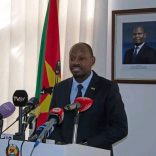Mozambique adds over €12 million to public debt in Q2 2025"
Civil society calls for audit of Mozambican public debt

Mozambican civil society organisations, grouped in the Budget Monitoring Forum (FMO), have demanded an exhaustive audit of the Mozambican public debt “in order to know the real amounts involved, the creditors and the payment period for each of the debts”.
The FMO is a coalition that contains some of Mozambique’s most credible civil society organisations, including the Community Development Foundation (FDC), the Centre for Public Integrity (CIP), and the Community Radio Forum (FORCOM).
Its statement is in reaction to the revelation that, in 2013 and 2014, the government, then headed by President Armando Guebuza, ran up debts, guaranteed by the Mozambican state, of over a billion US dollars that were disclosed neither to the International Monetary Fund (IMF) nor to the Mozambican public. The discovery of these debts led to a crisis in relations with the IMF, which cancelled a mission to Mozambique and suspended the second instalment of a loan for 283 million dollars from the Fund’s Standby Credit Facility.
Not only should there be an audit, the FMO demanded, but the government should also “publish inside Mozambique, and not merely abroad, all information about the public debt, for the knowledge of Mozambican citizens, for it is they who will have to pay the debt”.
It urged the government to explain publicly its strategy for paying the debt “and announce measures to hold responsible the authors of the present crisis”.
The FMO also wants a detailed inventory of the domestic debt “identifying the creditors, and the period in which the debt must be paid”. Domestic indebtedness results from the sale of treasury bonds at high interest rates, most of which are purchased by the banks. The FMO suggests that the state should only resort to domestic debt when strictly necessary, precisely because of the high interest paid.
The statement called for “a matrix of priorities for indebtedness” so that in future no government “can contract debts for projects of debatable or doubtful viability”.
As for the Mozambican parliament, the Assembly of the Republic, it should ensure that no government ever again violates the limits set in the annual budget laws on the amount of debt which the government can guarantee. In 2013, the government smashed through the limit set by that year’s budget law, and nobody has yet been held responsible for that illegality.
The FMO suggests passing a “Fiscal Responsibility Law” which will punish any future violation on the limits of government guaranteed debt, and ensure that “public managers who damage the State shall be punished in exemplary fashion”.
It also calls on the Attorney-General’s Office to investigate and to “hold responsible, administratively and criminally, all those leaders involved in contracting debts in a non-transparent manner and in violation of the budget law particularly in the last five years (2010-2015)”.
The FMO points out that, according to the figures available, Mozambique’s public debt grew at the startling pace of over 20 per cent a year in the past five years, reaching the nominal sum of at least 8.1 billion dollars. But with the transformation of the 850 million dollar bond issued by EMATUM (Mozambique Tuna Company) into government sovereign debt, and the discovery of previously undisclosed debts (for the defence company Pro-Indicus and for the Pemba Logistics Base) of over a billion dollars, the public debt has suddenly risen by a further two billion dollars.
Prior to the latest revelations, the Ministry of Economy and Finance estimated the public debt at 49 per cent of Gross Domestic Product. But the latest reports indicate that it has now reached the alarming figure of 73.4 per cent of GDP.
Worse still, the structure of the debt has changed. In 2010, the debt consisted almost exclusively of soft loans. But by 2014, almost 50 per cent of the debt was commercial loans with much shorter repayment times, and higher interest rates – and that figure, taken from an official Ministry of Economy and Finance document, was before the inclusion of the EMATUM, Pro-Indicus and Pemba Logistical Base debts. Today, when the newly discovered debts are included, well over 50 per cent of the public foreign debt must be on commercial terms.
The FMO argues that much of Mozambique’s public debt “has been contracted to implement investment projects the priority of which is very debatable. They are not even capable of paying for themselves, much less creating opportunities to generate expanded and diversified income which could contribute towards solving the main problems of poverty in the country: hunger, chronic malnutrition, lack of access to clean drinking water and sanitation, as well as chronic diseases”.












Leave a Reply
Be the First to Comment!
You must be logged in to post a comment.
You must be logged in to post a comment.